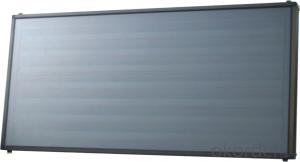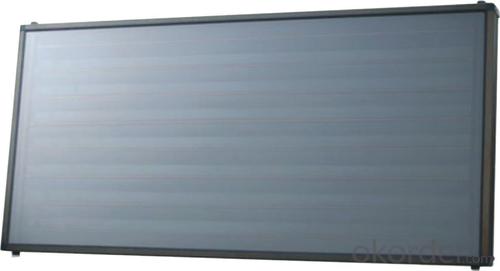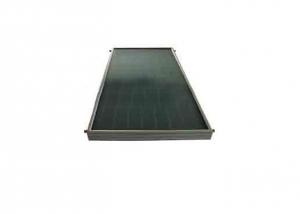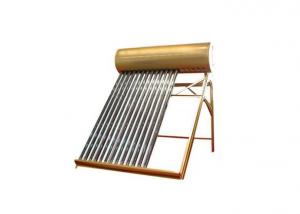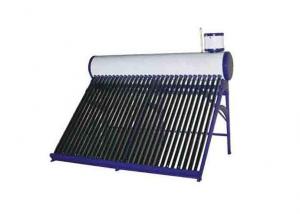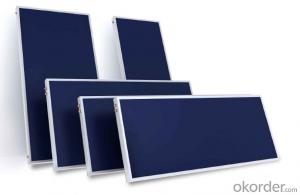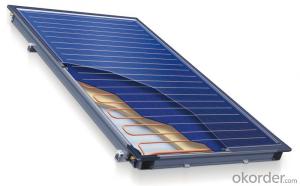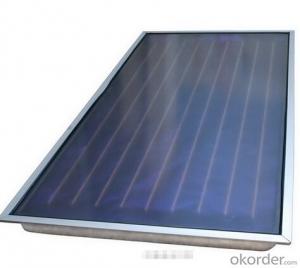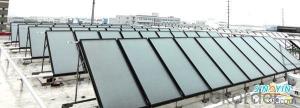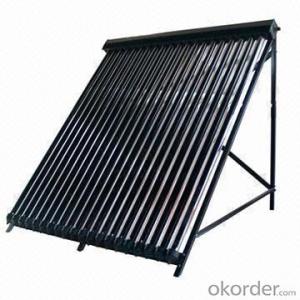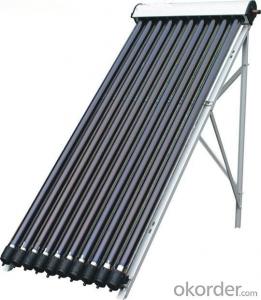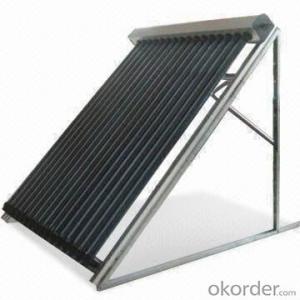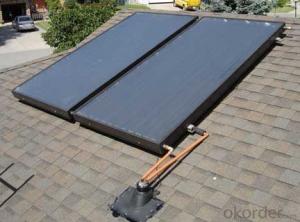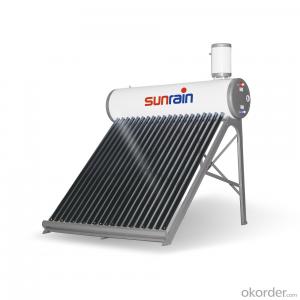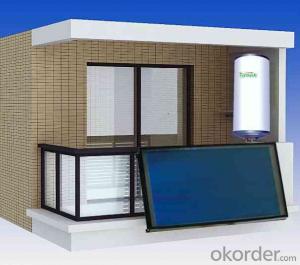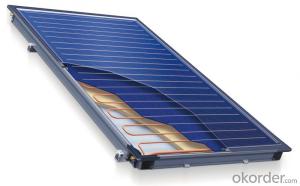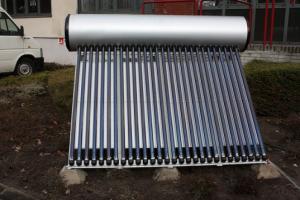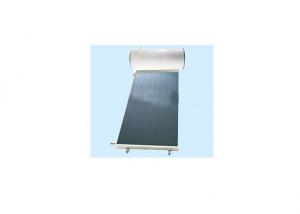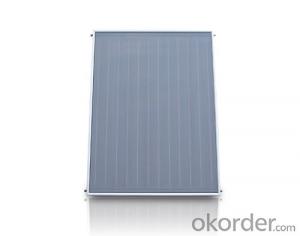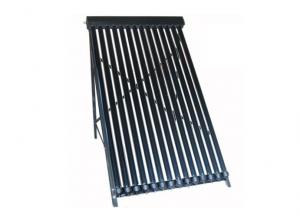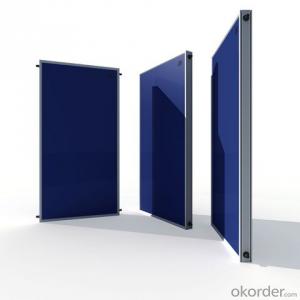Dome-Shaped Solar Energy Collector with Solar Thermal Absorber and Vacuum Solar Collector with Heat Pipe
- Loading Port:
- Shanghai
- Payment Terms:
- TT OR LC
- Min Order Qty:
- 500 pc
- Supply Capability:
- 10000 pc/month
OKorder Service Pledge
Quality Product, Order Online Tracking, Timely Delivery
OKorder Financial Service
Credit Rating, Credit Services, Credit Purchasing
You Might Also Like
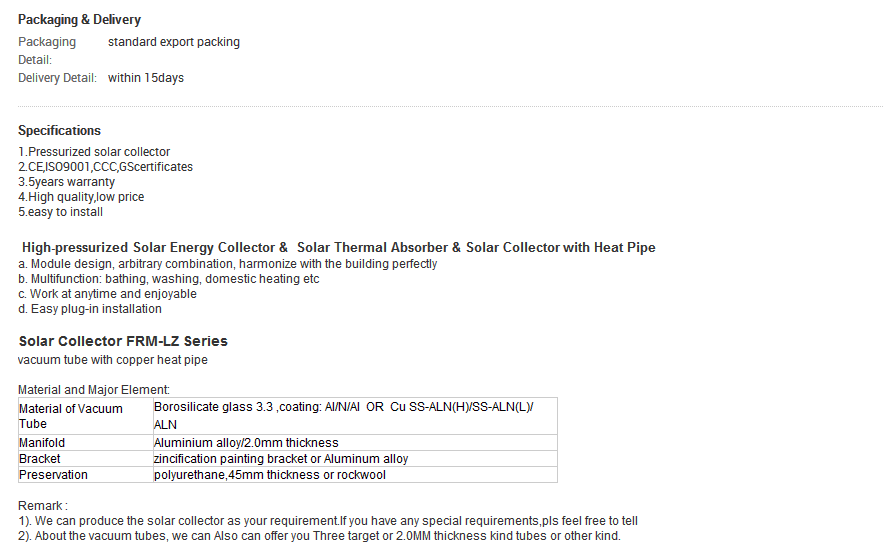
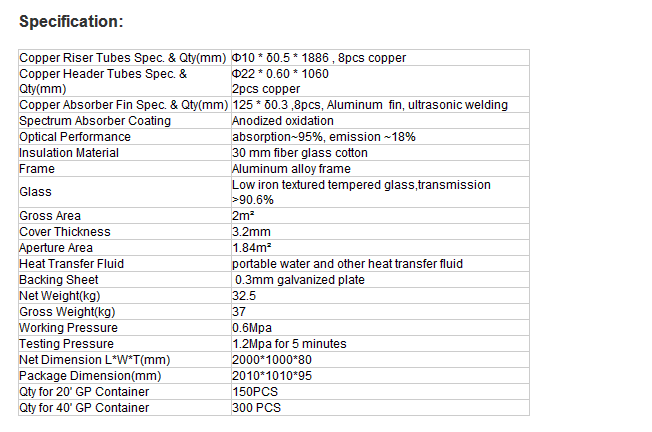
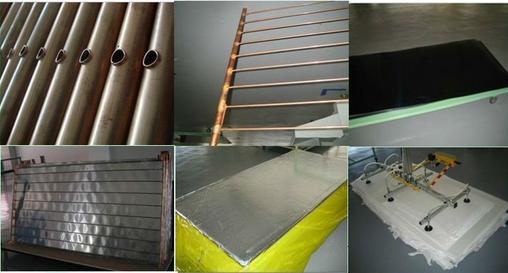
- Q: Can solar collectors be used in military operations?
- Yes, solar collectors can be used in military operations. They provide a reliable and sustainable source of energy that can be used to power various equipment and systems, reducing the need for traditional fuel sources. This can enhance military operations by increasing energy independence, reducing logistics burden, and minimizing the environmental footprint of military activities. Additionally, solar collectors can be easily deployed in remote or austere environments, making them particularly useful for military operations in off-grid locations.
- Q: Can solar collectors be used for heating temples?
- Yes, solar collectors can be used for heating temples. By harnessing the sun's energy, solar collectors can generate heat that can be used to warm up the interiors of temples. This sustainable and renewable energy source can help reduce the environmental impact of heating systems while providing a comfortable temperature for worshippers and visitors.
- Q: How long does it take to install a solar collector system?
- The installation time for a solar collector system can vary depending on several factors such as the size of the system, complexity of the installation, and the experience of the installation team. On average, a residential solar collector system can take anywhere from one to three days to install. However, larger commercial systems might take longer, sometimes up to a week or more. It is best to consult with a professional installer to get an accurate estimate based on your specific project requirements.
- Q: Can solar collectors be used for heating livestock barns?
- Yes, solar collectors can be used for heating livestock barns. Solar collectors can harness solar energy and convert it into heat, which can then be used to warm up the barns and create a comfortable environment for the livestock. This not only helps to reduce energy costs but also promotes sustainability by utilizing renewable energy sources.
- Q: Can solar collectors be used in areas with strict building codes?
- Yes, solar collectors can be used in areas with strict building codes. However, the installation and design of solar collectors must comply with the specific regulations and guidelines set by the local building authorities. This may include considerations such as the size, placement, and aesthetic requirements of the solar collectors to ensure they integrate seamlessly with the existing architectural style and structures in the area. It is essential to consult with building officials or professionals experienced in navigating building codes to ensure compliance while incorporating solar collectors.
- Q: Can solar collectors be used for heating bus stops?
- Yes, solar collectors can be used for heating bus stops. By capturing and converting sunlight into heat energy, solar collectors can provide a sustainable and eco-friendly solution for heating bus stops, ensuring passenger comfort even in colder climates.
- Q: Can solar collectors be used for heating recreational vehicles and boats?
- Yes, solar collectors can be used for heating recreational vehicles and boats. Solar heating systems, such as solar water heaters or air heaters, can be installed on these vehicles to harness the sun's energy and provide heating for the interior spaces or water systems. These systems are environmentally friendly and can help reduce the reliance on traditional fuel sources while providing an efficient heating solution for recreational vehicles and boats.
- Q: Are solar collectors suitable for heating retail stores?
- Yes, solar collectors are suitable for heating retail stores. They can effectively harness solar energy to provide sustainable and cost-effective heating solutions for retail spaces. This can help reduce energy costs and carbon emissions while maintaining a comfortable indoor environment for customers and employees.
- Q: Can solar collectors be used to generate electricity for remote communication systems?
- Solar collectors, also known as solar panels or photovoltaic systems, have the definite capability to generate electricity for remote communication systems. Through the photovoltaic effect, these devices convert sunlight into electrical energy. As a result, they are a highly suitable and efficient power source for communication systems situated in areas with limited access to the main power grid. There are several advantages to utilizing solar collectors for remote communication systems. Firstly, solar power is a renewable and sustainable energy source. This means that it relies on the abundance of sunlight rather than finite resources such as fossil fuels. Consequently, it is an environmentally friendly option for supplying power to communication systems in remote locations. In addition, solar collectors require minimal maintenance and have a long lifespan. This makes them a reliable and cost-effective solution for remote areas. They can be installed on rooftops, poles, or even seamlessly integrated into the communication system's design. This adaptability allows for easy deployment in various remote locations, including rural areas, mountaintops, deserts, and offshore installations. Thanks to advancements in solar technology, solar collectors can generate electricity even in low light conditions. This ensures a continuous power supply for remote communication systems, even during cloudy or overcast days. Moreover, any excess energy generated during peak sunlight hours can be stored in batteries for use during periods of low sunlight or at night. This provides uninterrupted power to the communication system. Overall, the utilization of solar collectors for remote communication systems is a practical and sustainable solution. It enables reliable and independent power generation, reduces reliance on traditional energy sources, and contributes to the broader objective of achieving energy efficiency and environmental sustainability.
- Q: Can solar collectors be used for heating water for agricultural purposes?
- Yes, solar collectors can be used for heating water for agricultural purposes. Solar water heating systems can provide a cost-effective and sustainable solution for heating water used in various agricultural processes such as crop irrigation, livestock watering, and greenhouse heating. By harnessing the sun's energy, solar collectors can efficiently heat water, reducing the reliance on fossil fuels and lowering operating costs for farmers.
Send your message to us
Dome-Shaped Solar Energy Collector with Solar Thermal Absorber and Vacuum Solar Collector with Heat Pipe
- Loading Port:
- Shanghai
- Payment Terms:
- TT OR LC
- Min Order Qty:
- 500 pc
- Supply Capability:
- 10000 pc/month
OKorder Service Pledge
Quality Product, Order Online Tracking, Timely Delivery
OKorder Financial Service
Credit Rating, Credit Services, Credit Purchasing
Similar products
Hot products
Hot Searches
